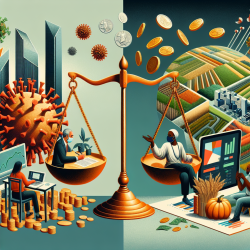Understanding COVID-19's Economic Impact: Lessons for Practitioners
The COVID-19 pandemic has left a significant mark on global economies, affecting both urban and rural communities in unexpected ways. A recent study titled COVID-19's impacts on incomes and food consumption in urban and rural areas are surprisingly similar: Evidence from five African countries sheds light on these impacts across five African countries. This blog explores the findings and offers insights for practitioners in the field of education and therapy, particularly those working with diverse communities.
Key Findings from the Study
The study surveyed 4000 households across Kenya, Mali, Nigeria, Senegal, and Zambia, assessing the pandemic's impact on income and food consumption. Contrary to initial predictions, the impact on incomes was less severe than anticipated, and the effects were widespread across both urban and rural areas. Here are some key takeaways:
- Income drops were 43–63% smaller than early estimates.
- Both urban and rural areas experienced similar impacts, challenging the notion that urban areas would be disproportionately affected.
- The severity of income effects correlated with the stringency of government restrictions.
Implications for Practitioners
For practitioners in education and therapy, these findings underscore the importance of understanding the nuanced impacts of global crises like COVID-19. Here are some ways practitioners can apply these insights:
- Holistic Support: Recognize that both urban and rural communities may need support. Develop programs that address the unique challenges faced by each community, such as access to food and income-generating opportunities.
- Policy Advocacy: Advocate for policies that consider the interconnectedness of rural and urban areas. Encourage governments to implement measures that support all communities equally, especially during crises.
- Research and Data Collection: Engage in further research to understand the long-term impacts of COVID-19 on different communities. Use data to inform the development of targeted interventions.
Encouraging Further Research
While the study provides valuable insights, it also highlights the need for continued research. Practitioners are encouraged to explore the following areas:
- Long-term Economic Impacts: Investigate how the pandemic's economic impacts evolve over time and affect different sectors.
- Food Security Strategies: Examine the effectiveness of various food security strategies implemented during the pandemic and identify best practices.
- Community Resilience: Study the factors that contribute to community resilience in the face of economic shocks and how these can be strengthened.
By engaging in further research and applying the findings from this study, practitioners can enhance their skills and better support the communities they serve.
To read the original research paper, please follow this link: COVID-19's impacts on incomes and food consumption in urban and rural areas are surprisingly similar: Evidence from five African countries.










